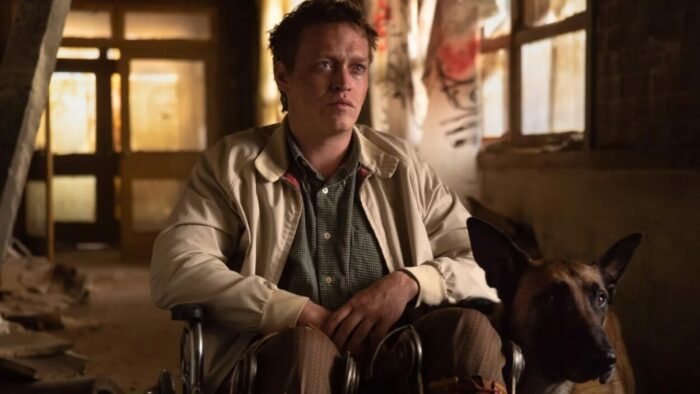French director Luc Besson’s films rarely bore. His stylish Nikita (in America, released as La Femme Nikita) practically defined the “Cinema du Look” with its vivid visuals and narrative panache; so too did what is for many his masterpiece, Leon (The Professional). Luc’s post-du Look films, a varied, cosmopolitan bunch, never lack for visual panache, from the 1990s (The Messenger: The Story of Joan of Arc, The Fifth Element) to the 2010s (Lucy, Valerian and the City of a Thousand Planets). His newest, DogMan, a weird, wild antihero origin story, similarly balances Besson’s penchant for striking visuals with an oddball story that is by turns exasperatingly tedious and curiously affecting, a quirky tale of dogs and drag that almost, just almost, works.
Certainly, the film does not lack for a charismatic, unusual protagonist, nor does it for a portrayer up to the task. Caleb Landry Jones (Get Out, Three Billboards Outside Ebbing Missouri) plays the “DogMan” of the film’s title, a man named Douglas, who is arrested just as the film opens. Behind the wheel of a moving van loaded with dogs, Douglas crashes and is taken into custody, where he is interviewed by police psychiatrist Evelyn (Jojo T. Gibbs, Past Lives). There, Douglas—in drag and in a wheelchair, two aspects of his character’s personality the film attends to with some surprising gravity—tells his story to Evelyn.
Some of what follows is so leaden and cliché-ridden it threatens to sink the film nearly before it begins. That within minutes of his apprehension Douglas immediately finds in Evelyn such a sympathetic ear he is compelled, for the first time in a life lived on the margins of society, his full life story, beginning with his abusive childhood, is patently absurd. The story he tells is in and of itself fascinating, but its manner of telling—long sequences of him speaking to Evelyn in his cell—are visually uninteresting and, from a narrative perspective, simply unnecessary. Sadly, a few slight attempts to gift Evelyn some modest characterization are lacking, and the whole interrogation conceit falls flat.
The story Douglas tells, however, is full of surprise and vigor, going anywhere and everywhere. There’s his origin down on the farm, where his disability is revealed as the result of his father’s abuse. There’s his kinship with dogs, a companionship he could never find with humans, lovingly and convincingly depicted. Played as a boy by Lincoln Powell, Douglas is unloved and abandoned, learning to navigate the world using a wheelchair and developing—another surprise—an affection for, first, theater and then drag. A sympathetic drama coach Salma (Grace Palma) teaches him Shakespeare. Later, as played again by Jones, Douglas finds himself looking for work in a drag club filled with faux versions of Madonna and Cher and, channeling his dramatic chops, delivers a showstopping performance of Edith Piaf’s “Milord.”
And so, each of the key components of Douglas’s character, the “DogMan,” is dutifully explained in a script full of potential potholes, not all of which Besson can avoid. (Some, indeed, result in full-frontal faceplants.) Douglas’s disability is presented credibly, a consequence of abuse he learns to manage but that always presents challenge. He can walk, but only for a few steps, and with risk of further injury: each step he takes, he tells Evelyn, is one “toward death.” (It’s not an especially subtle stroke of foreshadowing.) So too is the case with Douglas’s drag, which becomes a key part of his personality, an outlet by which he can create a persona to deal with a world that has traumatized and rejected him.
The script is on some shaky ground here in the 2020s with a villainous antihero in drag and an able-bodied actor in a wheelchair, but thankfully, in Dogman these become core aspects of Douglas’s personality rather than clichéd excuses for villainy. The third aspect, that of the film’s title, his companionship with dogs, also, surprisingly, works, in no small part because of Dogman’s adept animal wranglers, who have the canine cast adroitly pulling off elaborate crime capers and perfectly timed reaction shots. Besson’s script may elicit more than a few groans (like when an injured Doug shows one of his dogs a magazine cover of a police car and sends it in search of one like in an episode of Lassie), but dang if the dogs (and their trainers) don’t do their job.

The longer DogMan stays in its narrative past, with the scenes and characters depicting Douglas’s descent into crime, his pursuit by a dogged insurance investigator (played by Christopher Denham), and eventual apprehension, the better it works, even despite its gaffes and clichés. Where it slogs is in its narrative present, with the interrogation sessions between Douglas and Evelyn eliciting neither spark nor flame. It’s not like Clarice steeling up to interview Hannibal: there’s almost no feeling, emotion, or stakes in the interactions between the two, and for all the bravura of his choicemaking elsewhere in the film here Jones sticks to a quiet, occasionally almost inaudible and rarely affecting monotone. Gibbs’s character is a single mother who lives with her own mother; that’s all one learns from these interactions about her ultimately unnecessary character.
That DogMan works at all is credit to Jones and his riveting performance; to Besson’s script and direction, though both are wildly uneven; to its impeccable cast of canines; and to a story that is on the surface an oddball mishmash of character traits but that, in the end, add up to something surprisingly affecting, a tale of a man’s isolation from society and descent into crime, made tolerable only by his predilection for drag and companionship with dogs. DogMan is by no means great, but it’s certainly memorable.


